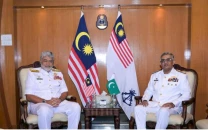Case Study: Taking Georgia’s example
According to TI Corruption Perception Index to 51 out of 176 counties in 2012 from 130 out of 159 countries in 2005.

Pakistan should also identify the forms of corruption its people dislike most and target these areas to create a social campaign against the menace, says Klitgaard. Photo: File
Robert Klitgaard, professor at California’s Claremont Graduate University and a leading expert on corruption, said Pakistan could benefit from following the examples of other countries, such as the Republic of Georgia, in tackling corruption.
Klitgaard said Georgia achieved an anti-corruption transformation by identifying and eliminating the two things people in Georgia most frequently associate with corruption: extortion by law enforcement officers and graft in the power sector.
For example, in one instance, Georgia’s government sacked an entire traffic police force notorious for its corrupt practices, Klitgaard said.
These efforts helped Georgia improve its standing on Transparency International’s (TI) Corruption Perception Index to 51 out of 176 counties in 2012 from 130 out of 159 countries in 2005.
Klitgaard said Pakistan should also identify the forms of corruption its people dislike most and target these areas to create a social campaign against the menace.
He suggested other subversive strategies which could be utilised, such as mapping linkages of political appointees with recipients of public contracts and analysing core weaknesses within corrupt systems to help eliminate such systems.
“If the new Pakistani government does not want to end corruption, nothing will happen. But if it does, then there are examples from around the world which can be followed,” he said.
Published in The Express Tribune, March 21st, 2013.



















COMMENTS
Comments are moderated and generally will be posted if they are on-topic and not abusive.
For more information, please see our Comments FAQ